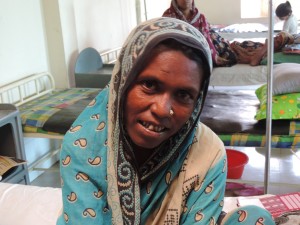By Kate Grant, CEO, Fistula Foundation
This week, the international aid world will convene in New York City during the United Nations General Assembly to discuss data, procedures, progress or perhaps lack thereof. But it’s important to remember that behind all of these facts and figures are women like Shefali*.
At age 20, Shefali was a happy wife and mother of a beautiful son. Like most women, when she became pregnant with her second child she was excited about expanding her family. She went into labor at home alone, without access to a skilled birth attendant, as do more than two thirds of women in Bangladesh. After enduring a day of excruciating labor she felt that something was wrong. She knew that her baby had already died inside her womb. Her husband took her to the hospital where the stillborn baby removed, but this was just the beginning of Shefali’s suffering.
Not long after, Shefali began to leak urine: days of obstructed labor had caused an obstetric fistula, an injury that caused her to become incontinent.

Obstetric fistula is a terrible injury happening to some of the poorest women in the world. As in Shefali’s case, it occurs when a woman’s labor becomes obstructed and constant pressure from the fetus causes tissue to die. As a result, a small hole is created that causes the woman to become incontinent. The smell of her incontinence often spurs a woman’s husband to leave and community to abandon her – and even worse, she often thinks it’s her fault, believing she’s cursed. Her child usually does not survive.
The most shocking part? The surgery that can completely transform a woman’s life costs as little as $450 and often takes less than an hour to complete. Yet there are women like Shefali with fistula today who have lived with this condition for decades because they do not know treatment is available or because they cannot afford to access it.
Recently, Shefali heard about the free obstetric fistula repair services offered by HOPE Hospital for Women and Children of Bangladesh, a Fistula Foundation partner. She arrived at the hospital in Cox’s Bazar for treatment, eager for the surgery that would finally cure her and allow her to once again walk with pride through her village, free from the burden of obstetric fistula.
Continue reading this post at Girls’ Globe.
Publish on: Sep 22, 2014